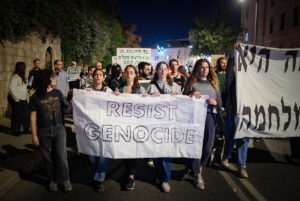For more Israelis, calling out war crimes is no longer taboo

Activists protest against the war and the humanitarian crisis in Gaza, in central Jerusalem, 20 May 2025
Meron Rapoport writes in +972 on 29 May 2025:
Last week, Israeli opposition leader Yair Golan made international headlines when he declared in an interview on Israeli public radio that “a sane country does not wage war against civilians, does not kill babies as a hobby, and does not aim to expel a population.”
It was a rare internal indictment, although to suggest Israel is committing war crimes in Gaza is hardly a radical claim. The army itself admitted to Israeli outlet HaMakom that 82 percent of those killed in Gaza during the first two months after the ceasefire collapsed were civilians. The nine children of the Al-Najjar family, or those burned alive in Gaza’s Fahmi Al-Jarjawi school following an Israeli airstrike — these are the most recent flesh-and-blood evidence of this brutal reality.
But just days later, Golan changed course and asserted on Channel 12’s “Meet the Press” that “Israel has not committed war crimes in Gaza,” and “doesn’t kill babies for fun.”
An easy explanation for Golan’s reversal lies in electoral calculations. A poll by Israeli daily Maariv showed Golan’s Democrats party dropped from 16 to 12 projected Knesset seats after his initial interview on public radio. Yet in a subsequent poll by Channel 12, 5 percent of respondents said they would not vote for Golan after his comments, but 7 percent said that they had decided to vote for him because of what he said.
In recent months, Golan has benefited from being seen as the only opposition figure willing to confront Netanyahu and his government head on, and his prominence in the anti-government protest movement has grown accordingly. In this regard, this latest confrontation should only reinforce that image.
Yet even the Maariv poll alone — which still awards Golan 12 seats after his “killing babies as a hobby” remark, reveals something surprising. In a political climate where accusing Israel of deliberately killing Gaza’s children is utterly illegitimate, and where, according to a horrifying new poll, 82 percent of Israeli Jews endorse mass expulsion and 47 percent support the biblical-scale slaughter of conquered cities — somehow over 10 percent of Jewish Israelis still backed a politician who condemned these very atrocities. And this was before his reversal.
When we include Israel’s Palestinian citizens, who hardly need Yair Golan to name what they see daily, we find that more than 20 percent of the population in Israel believes that their country is committing war crimes in Gaza. If that’s the case, we should hear this view from one in five commentators, analysts, and pundits. Yet in reality, you’d be hard-pressed to find even one in 100 — even 500 — willing to voice such criticism in Israeli media.
The silencing of these concerns isn’t new. Before October 7, challenging the myth of Israel’s fundamental military righteousness was already politically toxic. After the attacks, it became utterly unthinkable. But in recent weeks, especially since Israel unilaterally broke the ceasefire in early March, awareness of the army’s war crimes in Gaza has moved beyond the radical left and Palestinian community, and into wider mainstream discourse.
There is ex-Israeli army chief Moshe Ya’alon, who said recently that Israel “sends soldiers to commit war crimes in Gaza,” and former Prime Minister Ehud Olmert, who this week claimed that Israel is “no longer fighting against Hamas” and decrying its weaponization of starvation as a war crime. And there are the growing weekly demonstrations where participants hold photos of Palestinian children killed in Gaza, and former judges and other senior officials signing petitions invoking the “duty to refuse manifestly illegal orders.”
So while Golan’s reversal is disappointing — particularly from someone positioning himself as Netanyahu’s principled alternative — his individual stance matters less than the shifting political landscape it reflects. That these voices remain excluded from mainstream discourse doesn’t mean they don’t exist, or that they aren’t growing — it only reveals the cowardice and moral bankruptcy of the Israeli media and the political establishment.
The army’s corroding credibility
Even before March, when Israel unilaterally violated the ceasefire, cracks had already appeared within Israel’s centrist bloc — the same public that flooded streets to protest the judicial coup yet reported for reserve duty after October 7, whether out of genuine belief in “destroying Hamas” or a sense of duty. Ya’alon, a bellwether for Israel’s centrist public, began describing Gaza’s destruction as “ethnic cleansing” as early as December 2024, and his language has profoundly influenced mainstream discourse, including figures like Yair Golan.
But when Israel explicitly sabotaged a comprehensive hostage deal to prolong the war, those cracks became chasms. Through them, the unvarnished horrors of reality in Gaza have started to emerge.
